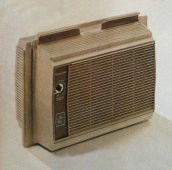Hogheavenfarm
Regulation Stifles Innovation
- Joined
- Jun 24, 2022
- Messages
- 432
Here is all I want to do - Run 1 chest freezer overnight, or if not possible, run the freezer during the day and let it coast overnight. We have blackouts often, 3 weeks was the longest, and cost of running a genny that long was enormous, even when gas was $1.99.
What I have - eight 100w panels - 5.5a 18v (typical panels) 2S4P(?) (2 in series 4 parallel sets)
(1) Renogy Rover Elite 40 amp 100v controller
(1) 200 amp hr SLA battery 12v (I am thinking I probably need another of these and then I would go 24v)
(1) 2000w no name inverter 12v (I am thinking I probably need another of these and then I would go 24v)
I get 3.8 hrs peak here, panels are south facing and get good exposure 10am to 6pm
Freezer stats are - 4 amps running 300w at 120v - surge is not listed but I am guessing about 10 amps. (This is a large freezer, 60"x28"x30")
My initial test of this system running a room a/c (for comparison, I cannot connect to the freezer at this time) was not very encouraging.
The little 2200 watt genny runs it ok.
We are old, so budget is pretty tight, and keeping food through these outages is very important to us.
Do I have all the required pieces? How can I arrange what I have to make the best use of this? Is this even possible with what I have? Any recommendations on different equipment?
What I have - eight 100w panels - 5.5a 18v (typical panels) 2S4P(?) (2 in series 4 parallel sets)
(1) Renogy Rover Elite 40 amp 100v controller
(1) 200 amp hr SLA battery 12v (I am thinking I probably need another of these and then I would go 24v)
(1) 2000w no name inverter 12v (I am thinking I probably need another of these and then I would go 24v)
I get 3.8 hrs peak here, panels are south facing and get good exposure 10am to 6pm
Freezer stats are - 4 amps running 300w at 120v - surge is not listed but I am guessing about 10 amps. (This is a large freezer, 60"x28"x30")
My initial test of this system running a room a/c (for comparison, I cannot connect to the freezer at this time) was not very encouraging.
The little 2200 watt genny runs it ok.
We are old, so budget is pretty tight, and keeping food through these outages is very important to us.
Do I have all the required pieces? How can I arrange what I have to make the best use of this? Is this even possible with what I have? Any recommendations on different equipment?



